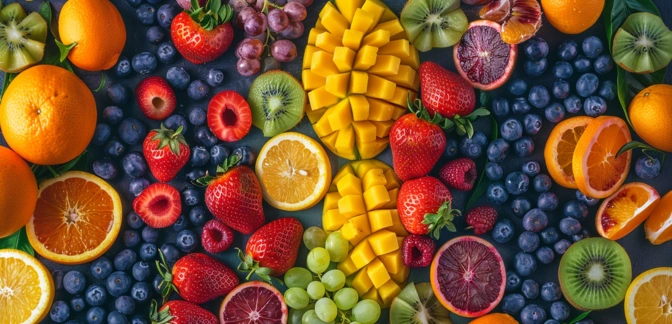Citrus Fruits — Nutrients, Health Benefits, And Shopping Tips

Written by Listonic Team
Last update on September 4, 2024
Nutrients
Nutrition facts
Amount per 100 g
Calories
🔥 53 kcal
| Nutrition per: 100 g | Value | % Daily Value* |
|---|---|---|
| Carbs | 13 g | 4.73% |
| Fiber | 2 g | 7.14% |
| Sugars | 9 g | 18% |
| Glycemic Index | 42 | - |
| Protein | 1 g | 2% |
| Sodium | 2 mg | 0.09% |
| Total Fat | 0 g | - |
*The % of Daily Value (DV) tells you how much a nutrient in a serving of food contributes to a daily diet. 2,000 calories a day is used for general nutrition advice.
42
🟢 Low Glycemic Index
Key takeaways
Health benefits
- Rich in Vitamin C, which supports immune function, skin health, and wound healing.
- Contains antioxidants such as flavonoids, which help protect the body from free radicals and reduce inflammation.
- Supports heart health by improving cholesterol levels, lowering blood pressure, and reducing the risk of heart disease.
- High in fiber, promoting digestive health, regular bowel movements, and a healthy gut microbiome.
- Hydrating and low in calories, making them a nutritious option for weight management and overall health.
Health risks
- High acidity which can cause or exacerbate symptoms of acid reflux, heartburn, or stomach discomfort in sensitive individuals.
- Potential for allergic reactions in some individuals, causing symptoms like itching, swelling, or difficulty breathing.
- Risk of tooth enamel erosion due to the high acidity of citrus fruits, which can weaken and erode tooth enamel over time.
- Interaction with certain medications such as statins or blood pressure drugs, as citrus fruits like grapefruit can interfere with their metabolism and effectiveness.
How to choose citrus fruits
When selecting citrus fruits, such as oranges, lemons, and limes, opt for ones that have a firm, smooth skin and are heavy for their size. Give them a gentle squeeze; they should yield slightly under pressure, indicating juiciness.
Shun citrus with soft spots, wrinkles, or blemishes, as these imperfections can affect both taste and longevity. Quality citrus fruits should have vibrant skin and emit a fresh, zesty aroma when zested or cut.

How to store citrus fruits
Citrus fruits are best stored in the refrigerator to extend their shelf life. Keep them in the crisper drawer to maintain their juiciness. Properly stored, citrus fruits can last up to two weeks.
Excessive moisture can cause citrus fruits to mold. Avoid washing them before storage; wash them just before use. Store them away from apples and bananas, which can speed up ripening and spoilage due to ethylene gas.
✅ Extra Tip
How long do they last?
Citrus fruits can last for 1-2 weeks at room temperature and up to 1 month in the refrigerator. Proper storage in a cool, dry place helps extend their freshness.
What to do with leftovers?
Leftover citrus fruits can be used in a variety of fresh and zesty dishes. Squeeze the juice into salads or dressings for a bright, tangy flavor, or use the zest to add a burst of citrus to baked goods like cakes, cookies, or muffins. Citrus fruits are also great in smoothies, where they add natural sweetness and acidity.
Use citrus segments in salads with greens, nuts, and a light vinaigrette, or mix them into a fruit salad for a refreshing treat. If you have a lot of citrus fruits, consider making a batch of homemade marmalade or preserving the peels in sugar for candied citrus. Citrus juice can also be used in marinades for meats, where it adds flavor and tenderizes the protein. For a unique twist, use citrus slices in a roasted chicken or fish dish for added moisture and flavor, or blend the juice into a citrus sorbet for a refreshing dessert.
👨⚕️️ Medical disclaimer
Discover products from other categories
Listonic Team
Fact-checked
Our editorial team checked this article to make sure it was accurate at the time of publishing it.
Get the top-rated shopping list app

citrus fruits
1 piece







